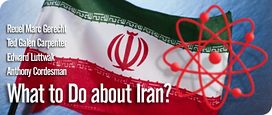While the debate continues, it would be useful to focus hard on the three possible options.
First of course is to do nothing. That is contrary to American activism in all things, from surgery to foreign policy, but it is the greatest lesson of statecraft that it is usually a good idea to do less rather than more, and plain inaction is usually the best option if
a) to do nothing leaves the situation unchanged;
b) that situation is judged to be tolerable ; and
c) there is no adverse change in the situation that is already underway.
To do nothing is best when others do nothing also, as when all sides decide to leave a buffer state in place, instead of trying to conquer pieces of it. In this case, however, that best of options is foreclosed because Iran’s nuclear-weapon program continues to advance. We know what these words mean regarding Iran, a country now ruled by religious fanatics who have violated all the rules by equipping, funding, training and publicly inciting at least three organizations that appear on all the terrorist lists, which have carried out large and small operations for Iran in third countries; and with each passing day Iran is closer to the possession of a nuclear explosive device. Given what Iran’s regime is now doing to attack American interests world-wide from Venezuela to Iraq even without the shield of nuclear weapons, it is irresponsible to do nothing and merely await to see how they will behave when they feel more secure.
The second option would be to accept any and all Iranian demands, including the payment of two billion dollars of Iranian claims dating back to 1979, as well as whatever additional demands might be imposed in pre-negotiations about negotiations, to then reach agreement on whatever issues can be agreed, or even on all issues as in Ted Galen Carpenter’s “Grand Bargain.”
Negotiations, to be sure, are the sovereign remedy for all international disputes. But not all parties want to negotiate at all times. As it happens, the Iranian regime is in that category. That is no a priori pronouncement but fact. Fact 1: Iran has recently been offered a rather generous package of incentives to stop its uranium enrichment activities. Fact 2: the regime has not replied with a yes, or a no, or a counter-offer. In the meantime it continues to enrich uranium. Actually, since 1979 there have been many attempts to negotiate but they all failed, essentially because power in Iran is not centralized in a coherent executive branch , but rather diffused among different power groups that are in constant competition and outright conflict with one another; as soon as any of them started an attempt to negotiate, if only about the terms of substantive negotiations, it was attacked by a more extreme group as weak, traitorous, un-Islamic etc. Those who wanted to talk never won these contests, because of the dominant internal dynamics: as religious oppression continues and the population at large becomes increasingly anti-clerical, to the extent that many Iranians have become “post-Islamic ,” the regime becomes more extreme, and must therefore reject negotiations. That is the standard reaction of fanatics when prophecy fails: the Islamic Republic was supposed to make the Iranians better Muslims, but instead it has become the agency of secularism (just as the aggressive secularism of the Shah’s father inadvertently promoted Islam). In each case, therefore, attempts at negotiations resulted in the collapse of the attempted talks, and the downfall of their advocates, who lost some power, or all of their power, or even their lives. Negotiations are not an option.
That leaves the third option: to weaken Iran in every way possible and worthwhile, from the material support of the Baluch, Kurdish and other insurgents already in the field, to the diplomatic support of the rising Azeri national movement, to the bombing of Iran’s nuclear installations at the right moment, once all possible counter-measures are in place to contain all the likely reactions, in Iran, the Gulf and beyond.
To weaken an enemy that cannot be ignored nor peacefully dissuaded is not the best option: it is the only option.

